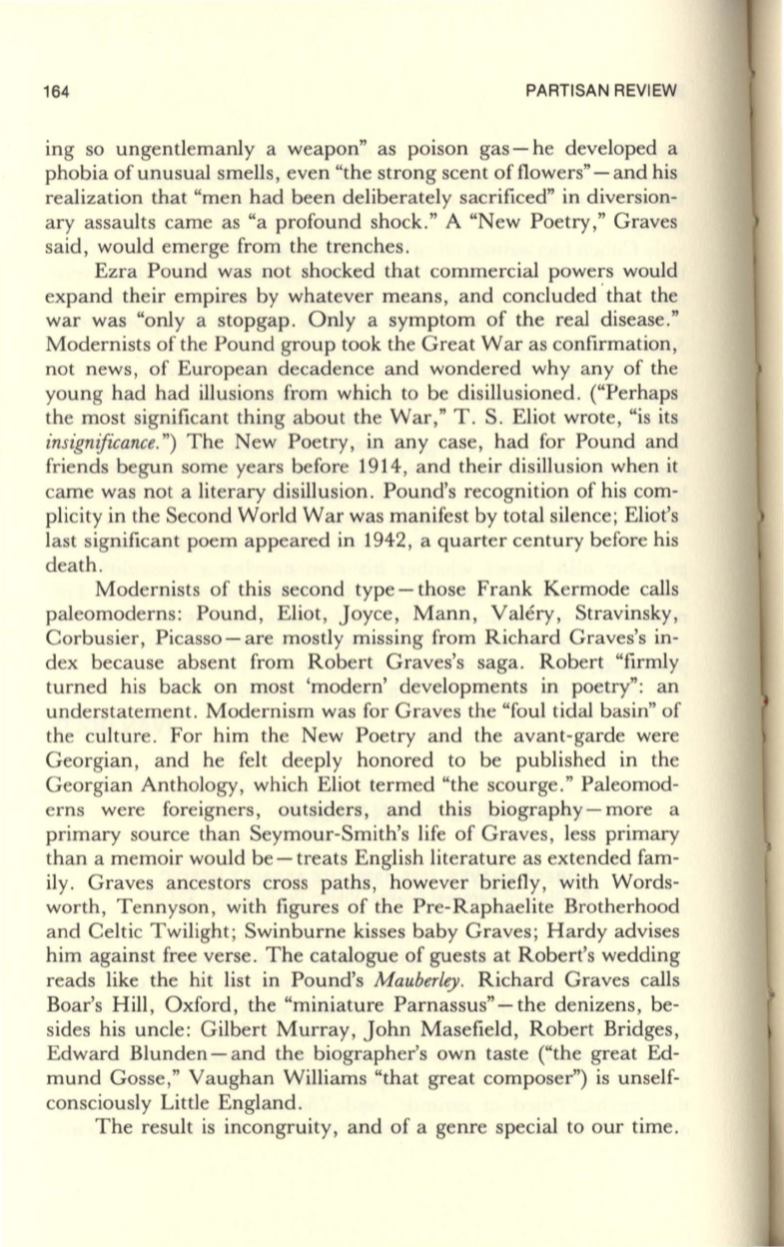
164
PARTISAN REVIEW
ing so ungentlemanly a weapon" as poison gas - he developed a
phobia of unusual smells, even "the strong scent of flowers" - and his
realization that "men had been deliberately sacrificed" in diversion–
ary assaults came as "a profound shock." A "New Poetry," Graves
said, would emerge from the trenches.
Ezra Pound was not shocked that commercial powers would
expand their empires by whatever means, and concluded 'that the
war was "only a stopgap. Only a symptom of the real disease."
Modernists of the Pound group took the Great War as confirmation,
not news, of European decadence and wondered why any of the
young had had illusions from which to be disillusioned. ("Perhaps
the most significant thing about the War," T. S. Eliot wrote, "is its
insignificance.")
The New Poetry, in any case, had for Pound and
friends begun some years before 1914, and their disillusion when it
came was not a literary disillusion. Pound's recognition of his com–
plicity in the Second World War was manifest by total silence; Eliot's
last significant poem appeared in 1942, a quarter century before his
death.
Modernists of this second type - those Frank Kermode calls
paleomoderns: Pound, Eliot, Joyce, Mann, Valery, Stravinsky,
Corbusier, Picasso-are mostly missing from Richard Graves's in–
dex because absent from Robert Graves's saga. Robert "firmly
turned his back on most 'modern' developments in poetry": an
understatement. Modernism was for Graves the "foul tidal basin" of
the culture. For him the New Poetry and the avant-garde were
Georgian, and he felt deeply honored to be published in the
Georgian Anthology, which Eliot termed "the scourge." Paleomod–
erns were foreigners, outsiders, and this biography - more a
primary source than Seymour-Smith's life of Graves, less primary
than a memoir would be - treats English literature as extended fam–
ily. Graves ancestors cross paths, however briefly, with Words–
worth, Tennyson, with figures of the Pre-Raphaelite Brotherhood
and Celtic Twilight; Swinburne kisses baby Graves; Hardy advises
him against free verse. The catalogue of guests at Robert's wedding
reads like the hit list in Pound's
Mauberley.
Richard Graves calls
Boar's Hill, Oxford, the "miniature Parnassus" - the denizens, be–
sides his uncle: Gilbert Murray, John Masefield, Robert Bridges,
Edward Blunden - and the biographer's own taste ("the great Ed–
mund Gosse," Vaughan Williams "that great composer") is unself–
consciously Little England.
The result is incongruity, and of a genre special to our time.


